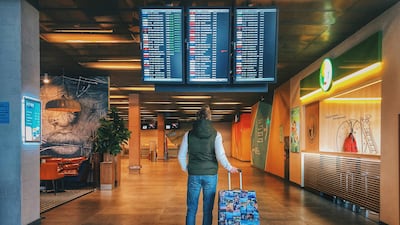The Muslim holy month is almost upon us. Every Ramadan, Muslims around the world fast from sunrise to sunset.
Waking before dawn to eat suhoor, people then refrain from eating or drinking anything until the sun goes down, when friends and family gather to break the fast together over iftar.
But when catching a flight, things can be a little different.
With changing time zones and the sun setting at a different time than in the country travellers may have departed from, here’s what you may need to know if you're catching a plane this Ramadan.
Do I need to fast when flying?
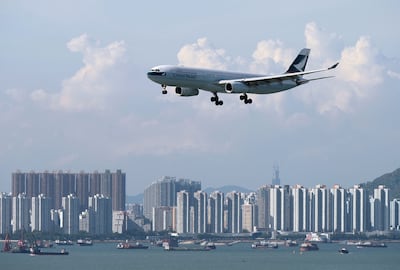
Many people continue to fast when flying and this is sometimes encouraged for shorter flights, but Muslims do not need to fast when travelling.
If the thought of breaking your fast mid-flight concerns you or you are worried about knowing the right times to eat, you can opt not to fast during your journey.
If fasting is not going to be feasible during your travels, Muslims can make up the days missed upon their return, or at any other suitable time in the future.
How do I know when to break my fast when flying?
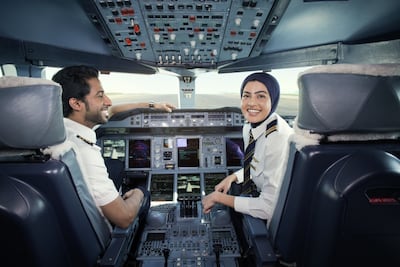
Travellers should follow the rules and times of where they are in the world, rather than those of the country that they departed from. That said, there's no need to stress about when you should break your fast, as on most airlines in the region, the captain or crew will inform passengers when it's time to eat, or to begin fasting again.
Emirates says it uses a tool to calculate the correct timings for imsak and iftar while in-flight, based on the times of sunrise and sunset of the location the flight is passing through, using the aircraft’s longitude, latitude and altitude.
If you are not flying in the GCC or are travelling on an airline that doesn't announce prayer times, you can simply break your fast once you see the sun set outside your window.
Will airlines give me food to break my fast when flying during Ramadan?

Several airlines, especially those in the Gulf or operating to and from Muslim countries, will offer passengers iftar or suhoor meals when flights coincide with these times.
This year, Emirates is serving iftar meals to passengers on flights from March 11. These will be presented in boxes designed with patterns from Emirati Al Sadu weavers. These Bedouin women would typically come together during Ramadan to spin and weave, while exchanging family news, singing and reciting poetry.
Dishes include baba ghanoush, Moroccan chicken and Arabic baklawa. Emirates’s Ramadan boxes will be served in addition to the regular hot meal service.
A smaller iftar box will also be served at select Emirates boarding gates at iftar time, including essentials such as water, laban and dates for travellers to comfortably break their fast.
From Abu Dhabi, Etihad Airways is serving Ramadan dishes that blend traditional Emirati and modern flavours with the likes of lamb bukhari with smoked cardamom yoghurt and chicken machbous pinza. Travellers flying in economy class will be served Arabic mezze, as well as a special Vimto mousse dessert.
Etihad passengers breaking their fast just before or after landing will be given Iftar bags decorated with a traditional Emirati artwork, containing laban, water, and dates, and passengers will also have the chance to donate their air miles during Ramadan.
Other airlines may not provide a regular meal service around iftar or suhoor times, but if you're flying economy class, you can ask the crew to hold your meal until you are able to eat it. In business and first-class cabins, you can typically order food as and when you require it.
If I'm not fasting but I'm flying during Ramadan, can I eat and drink as normal?
Travellers who are not Muslim or opting not to fast can continue to eat and drink as normal during flights, with airlines operating meal services, including serving alcoholic beverages if this is a service the airline typically provides.
On flights to Saudi Arabia during the holy month, some airlines may only serve cold meals.
Where can I pray on a plane during Ramadan?
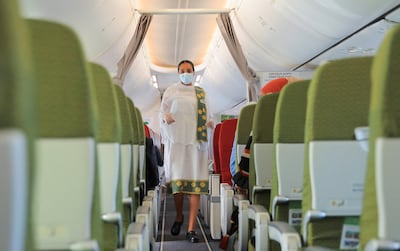
This very much depends on which airline you're travelling with.
If you are flying with Emirates or Etihad, you can use dedicated spaces designed for worship. Curtains can be pulled across so you have some privacy during your prayer; however, be aware that these spaces are limited and other passengers may want to pray too.
If you're flying with an airline that doesn't have an allocated praying space, or if the area is looking crowded with other travellers, you can simply pray in your seat, worshipping from your heart and head.
How do I know which direction to pray in when flying?
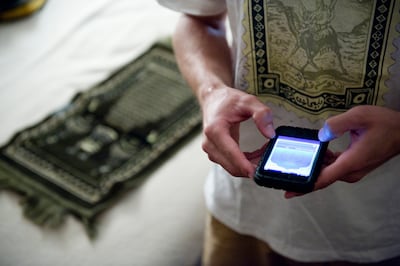
Some airlines have used technology to help make it easier for Muslims to identify which direction to pray in when flying. Real-time qibla finders built into entertainment systems are an effective way to identify the correct direction to face when offering prayers at any point during your flight.
Anything else I need to know?
Some airlines, including Emirates and Etihad Airways, provide Ramadan-themed television programmes, music stations and audio entertainment onboard.
Travellers can also download an app with passages from the Quran loaded onto it before flying, so you'll have something appropriate to read or listen to throughout your flight.
A version of this story first appeared on The National in April 2022
